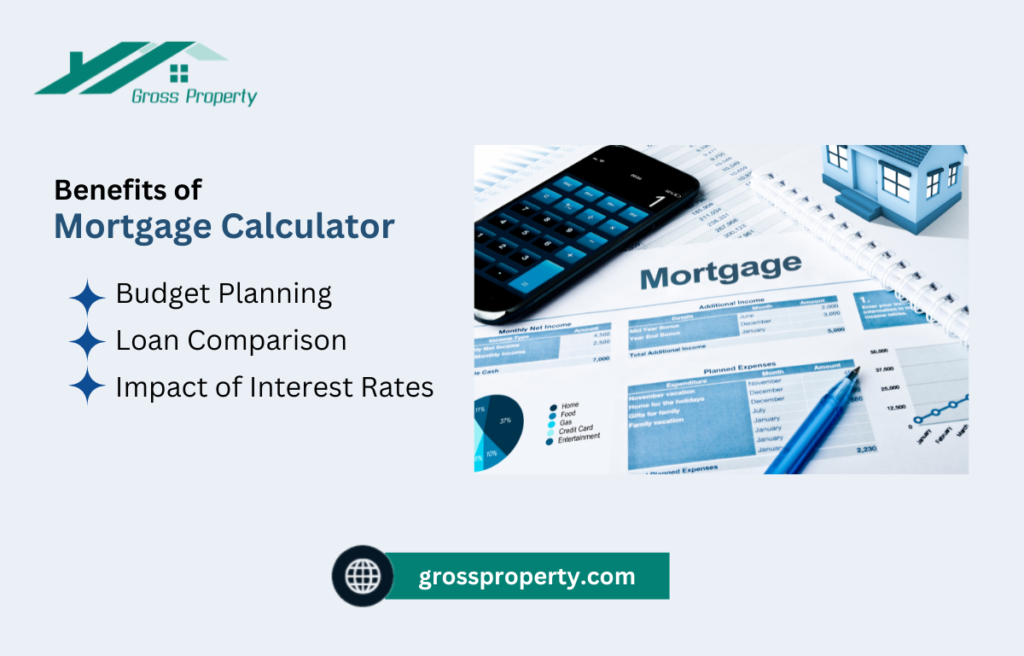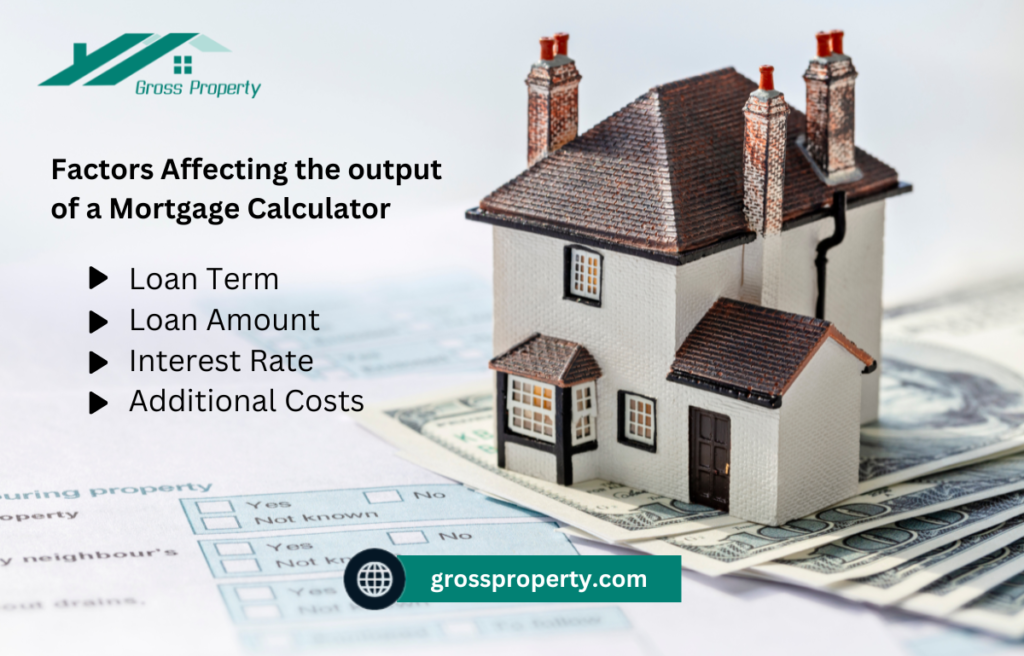A mortgage calculator is an essential tool for anyone looking to purchase a home, refinance an existing mortgage, or evaluate different loan options. By providing a quick and easy way to estimate monthly mortgage payments based on loan amount, interest rates, and other key factors, this tool helps potential homeowners make informed financial decisions. Whether you’re a first-time buyer or looking to make an investment, understanding how a mortgage calculator works can save you time and money, giving you a clearer picture of what you can afford.
What is a Mortgage Calculator?
A mortgage calculator is an online tool designed to help potential homeowners, investors, and those looking to refinance their current mortgage, estimate their monthly mortgage payments. It works by taking inputs such as the loan amount, interest rate, and loan term to provide an estimated monthly payment. These calculators are helpful because they offer an easy way to visualize how various loan options and interest rates will affect your finances without the need for complex manual calculations. The primary goal of a mortgage calculator is to assist users in making informed financial decisions when buying a home or refinancing their mortgage.
How Does a Mortgage Calculator Work?
Mortgage calculators typically work by using a set formula that includes the principal loan amount, interest rate, and the loan term to calculate your monthly payment. The general formula used is:
M=P×i(1+i)n(1+i)n−1M = P \times \frac{i(1+i)^n}{(1+i)^n-1}M=P×(1+i)n−1i(1+i)n
Where:
- M = Monthly payment
- P = Principal loan amount
- i = Monthly interest rate (annual rate divided by 12)
- n = Number of payments (loan term in months)
In addition to the core calculations, many advanced mortgage calculators also factor in property taxes, homeowner’s insurance, and private mortgage insurance (PMI), offering a more comprehensive estimate of monthly costs. Some calculators even allow users to explore how different down payments, loan types (fixed-rate, adjustable-rate), and payment schedules affect the outcome.
Why Should You Use a Mortgage Calculator?
Using a mortgage calculator offers several key benefits:
- Budget Planning: It helps potential buyers understand how much home they can afford by providing a clear picture of monthly payments based on different scenarios. This can help streamline the home-buying process, ensuring that buyers focus on properties within their financial range.
- Loan Comparison: A mortgage calculator enables users to compare different loan types and terms. For instance, you can see the difference in monthly payments between a 30-year fixed-rate mortgage and a 15-year loan. This allows you to make informed decisions about which loan is best suited to your financial goals.
- Understand the Impact of Interest Rates and Down Payments: By adjusting variables like the interest rate or down payment, you can see how these factors influence your overall loan cost. This can be especially helpful when trying to decide on the size of your down payment or when locking in an interest rate.
By using a mortgage calculator, you gain valuable insights that aid in financial planning, helping you avoid surprises and make better decisions when purchasing a home or refinancing an existing mortgage.

How can a Mortgage Calculator help with loan comparisons?
A mortgage calculator can be extremely helpful when comparing different loan options. By adjusting variables like interest rate, loan term, and down payment, you can quickly see how different scenarios affect your monthly payments and total loan cost. For example, you can compare a 15-year fixed mortgage with a lower interest rate to a 30-year mortgage with smaller monthly payments but higher interest over time.
Moreover, specialized loan comparison calculators allow users to compare several loans side-by-side, examining factors such as total interest paid, monthly payment amounts, and overall loan costs. This makes it easier to determine which loan best suits your financial goals.
Can a Mortgage Calculator Show Total Interest Paid Over the Loan?
Yes, many mortgage calculators, especially the more advanced ones, are designed to show not just the monthly payments but also the total interest paid over the life of the loan. By inputting key variables such as the loan amount, interest rate, and loan term, the calculator computes how much interest you’ll pay in total. This is particularly useful for comparing how different loan terms (e.g., 15 years vs. 30 years) or interest rates affect the long-term cost of your mortgage. Some calculators, like the ones offered by Omnicalculator and MortgageCalculator.org, also provide detailed amortization schedules, showing how much of each monthly payment goes toward interest and how much reduces the principal.
How accurate are Mortgage Calculators?
Mortgage calculators provide estimates that are generally accurate for calculating basic monthly payments, but they may miss certain details depending on the complexity of the tool used. Basic calculators might only consider principal and interest, while more advanced ones include property taxes, homeowner’s insurance, and PMI. The inclusion of these additional costs provides a more accurate representation of your monthly obligations.
However, it’s important to remember that calculators may not always account for regional differences in tax rates, insurance costs, or fluctuating interest rates in adjustable-rate mortgages (ARMs). Additionally, fees such as closing costs or HOA fees may be overlooked in simpler calculators. Thus, while mortgage calculators are a valuable tool for planning, consulting with a lender for precise figures is essential.
What are the key inputs for a Mortgage Calculator?
A mortgage calculator uses several key inputs to estimate monthly mortgage payments and total loan costs:
- Loan Amount: This is the principal amount borrowed, typically the home’s purchase price minus the down payment. The loan amount is a major factor that influences monthly payments.
- Down Payment: The initial payment made toward purchasing the home. Most lenders prefer a down payment of at least 20%, but options as low as 3% are available, especially with FHA loans. A larger down payment can reduce monthly payments and potentially eliminate the need for Private Mortgage Insurance (PMI).
- Loan Term: This is the length of time you agree to repay the mortgage, usually 15 or 30 years. Shorter loan terms often come with higher monthly payments but lower total interest.
- Interest Rate: The percentage charged annually by the lender on the loan amount. Fixed-rate mortgages keep the interest rate constant, while adjustable-rate mortgages (ARMs) fluctuate based on market conditions.
- Additional Costs: Some calculators also account for property taxes, homeowner’s insurance, and PMI, which can substantially impact your total monthly payment.
What Factors Affect the Results of a Mortgage Calculator?
Several factors can affect the output of a mortgage calculator:
- Loan Amount: The larger the loan, the higher the monthly payments and total interest paid over the term.
- Interest Rate: A higher interest rate increases both the monthly payment and the overall interest cost. Adjustable-rate mortgages (ARMs) may introduce variability in payments over time.
- Loan Term: A longer term, such as 30 years, will reduce the monthly payment but increase the total interest paid, whereas a shorter term, like 15 years, will increase the monthly payment but reduce the interest.
- Additional Costs: Property taxes, homeowner’s insurance, and private mortgage insurance (PMI) are often included in advanced calculators, giving a more comprehensive view of the total monthly payment. These costs can significantly increase the monthly payment but are sometimes overlooked in basic calculators.

How does the Mortgage Calculator handle different loan types?
Mortgage calculators are designed to accommodate various loan types by adjusting key parameters such as interest rate, loan term, and payment structures. For example, calculators can handle fixed-rate mortgages, where the interest rate remains constant throughout the loan term, as well as adjustable-rate mortgages (ARMs), which have interest rates that fluctuate after an initial fixed period. Typically, the calculator allows you to input the specific terms for each loan type, such as the adjustment period for ARMs or the term length for fixed-rate loans.
Calculators also cater to specialty loans like FHA loans (which have lower down payment requirements), VA loans (available for veterans with no down payment), and jumbo loans (for loan amounts exceeding conventional limits). Each of these loan types can be compared side by side to help borrowers choose the best option based on their financial situation.
What is the difference between a fixed-rate and adjustable-rate mortgage in a Mortgage Calculator?
A fixed-rate mortgage provides a consistent interest rate throughout the life of the loan, which means that your monthly payments remain the same. This predictability makes fixed-rate loans ideal for those who plan to stay in their homes long-term and want stability in their payments. A mortgage calculator will show a fixed rate as a constant value over the full loan term, allowing for easy budgeting.
On the other hand, an adjustable-rate mortgage (ARM) offers a lower interest rate at the beginning of the loan, which can adjust periodically based on market conditions. This means that after the initial fixed period (e.g., 5, 7, or 10 years), the interest rate—and therefore your monthly payments—can increase or decrease. Mortgage calculators that include ARMs will show an initial fixed payment period followed by a variable payment schedule, reflecting the potential for fluctuating rates. ARMs are generally better for those who expect to sell or refinance before the adjustable period begins.
When using a mortgage calculator, it’s essential to understand how these two types of loans differ in terms of long-term costs and risks.
Can you use a Mortgage Calculator for property tax and insurance estimates?
Yes, many advanced mortgage calculators incorporate property taxes and homeowner’s insurance into their calculations, providing a more comprehensive estimate of your total monthly mortgage payment. This is crucial because taxes and insurance can significantly impact your monthly expenses. For instance, property taxes are typically based on a percentage of the home’s assessed value, and homeowner’s insurance is required by lenders to protect both the property and the lender’s financial interest. Some calculators also account for private mortgage insurance (PMI) if your down payment is less than 20%.
These calculators not only provide estimates for these costs but also allow users to input their specific tax rates and insurance premiums, resulting in a personalized monthly payment that includes all homeownership expenses.
How does changing the interest rate impact monthly mortgage payments?
The interest rate is one of the most critical factors affecting your monthly mortgage payment. When you increase the interest rate, the monthly payment goes up because you’re paying more for borrowing the money. Conversely, a lower interest rate reduces the monthly payment, making the loan more affordable in the long run.
For example, on a 30-year mortgage, even a 1% change in the interest rate can significantly affect both your monthly payment and the total interest paid over the life of the loan. A mortgage calculator allows users to adjust the interest rate and see how it directly impacts their payment schedule and overall loan costs, making it easier to understand the long-term financial implications of different rates.
What Are the Limitations of a Mortgage Calculator?
While mortgage calculators are useful for estimating monthly payments and affordability, they have limitations:
- Oversimplification: Many basic calculators don’t include property taxes, homeowner’s insurance, or private mortgage insurance (PMI) in their calculations, which can result in underestimating the true cost of homeownership. More advanced calculators include these factors, but they are still estimates.
- No Pre-Approval Consideration: A mortgage calculator won’t account for the lender’s criteria for pre-approval, such as your credit score, employment history, or savings for a down payment. These factors can significantly affect your ability to qualify for a loan and the interest rate you’ll be offered.
- Variable Costs: Costs like property taxes and insurance premiums can vary by location and change over time, but most calculators rely on general averages, which might not reflect your actual costs.
For exact figures, it’s best to consult with a lender.
Can a Mortgage Calculator Help Determine How Much You Can Afford?
Yes, a mortgage calculator is an excellent tool for helping you determine how much home you can afford by factoring in your income, monthly expenses, and debt obligations. Most affordability calculators will assess your debt-to-income ratio (DTI), which is the percentage of your gross monthly income that goes toward debt payments, including your mortgage. Lenders typically prefer a DTI of less than 36%, though some may allow up to 43%.
By entering your income and expenses, the calculator will provide a maximum home price you can afford. It will also estimate your monthly mortgage payments based on factors like loan term, interest rate, property taxes, and insurance. These tools can give you a more realistic understanding of what home prices are within your budget, helping you plan for a home purchase.
Is a Mortgage Calculator Useful for Refinancing?
A mortgage calculator is extremely useful for refinancing, as it helps homeowners estimate potential savings. By entering details of the current loan (e.g., balance, interest rate) and the proposed new loan terms (e.g., new interest rate, loan duration), a refinancing calculator can show how much you’ll save on monthly payments and how much you’ll save in total interest over the life of the loan. It also often calculates the break-even point, showing how long it will take for the savings to offset the refinancing costs, like closing fees.
Refinancing calculators can help you decide whether refinancing to a lower interest rate or adjusting the loan term is financially beneficial in the long run. However, they also help you assess other key considerations, like closing costs, which can affect whether refinancing is a smart decision.
Should you rely solely on a Mortgage Calculator for financial planning?
No, relying solely on a mortgage calculator for financial planning is not advisable. While a mortgage calculator is a helpful tool for estimating monthly payments and affordability, it doesn’t take into account many other crucial aspects of financial planning. For example, it may not factor in your full financial picture, such as retirement savings, emergency funds, or high-interest debt. It also may not account for variable costs like property taxes or insurance premiums, which can fluctuate based on location and home value. Moreover, a mortgage calculator won’t assess your eligibility for a loan based on your credit score or employment history, which lenders consider when pre-approving you for a mortgage. For a more complete financial plan, it’s best to consult with a mortgage advisor or financial planner in addition to using the calculator.
How Do Mortgage Calculators Compare Across Different Platforms?
Mortgage calculators vary widely in terms of features and accuracy across platforms. For example, some calculators, like those from Rocket Mortgage and Redfin, provide detailed breakdowns that include property taxes, insurance, and PMI estimates based on your location and loan specifics. Other platforms, like Zillow and NerdWallet, focus more on affordability by calculating the maximum home price based on your income and DTI.
The main difference between platforms lies in the depth of customization and the level of detail. Some calculators allow users to adjust various factors like down payment, loan term, and interest rate, while others are more limited. It’s important to choose a calculator that provides the necessary details for your specific situation, especially if you’re looking to account for all homeownership costs.
How to Find the Best Mortgage Calculator for Your Needs?
Finding the best mortgage calculator depends on your specific goals. Here are some factors to consider:
- Comprehensive Features: Look for calculators that include not only principal and interest but also property taxes, insurance, and PMI (Private Mortgage Insurance). Tools from platforms like Rocket Mortgage and NerdWallet offer detailed calculations that incorporate these additional expenses.
- Customization Options: The best calculators allow you to adjust key variables such as loan term, interest rate, and down payment. For example, Chase and Bank of America offer calculators that let you experiment with different loan scenarios to see how they affect your payments.
- Extra Features: Some calculators, like those from Rate.com and Chase, also include options to factor in extra payments and closing costs, allowing you to see how these factors impact the total cost of your loan and help with budgeting for additional fees like appraisals and inspections.
By choosing a calculator that aligns with your financial situation and goals, you’ll be better equipped to make informed decisions about your mortgage.

Can a Mortgage Calculator factor in extra payments?
Yes, many mortgage calculators allow you to input extra payments, helping you see how additional payments can reduce the total interest paid and shorten the loan term. By making extra payments toward the principal, you can significantly decrease the amount of interest you pay over time and potentially pay off the loan years earlier. Some calculators even let you simulate how regular extra payments or lump-sum payments will impact your mortgage, giving you a clear picture of potential savings. However, it’s important to check with your lender about any prepayment penalties that might apply to early payments or large sums toward the mortgage balance.
Does a Mortgage Calculator Account for Closing Costs?
Many mortgage calculators, especially those provided by advanced platforms, can include closing costs in their calculations. Closing costs typically range from 2% to 5% of the home’s purchase price and cover expenses like title searches, appraisals, lender fees, and taxes. Calculators from sources like Chase and Bank of America are equipped to estimate these costs based on your loan amount and property location, providing a more accurate picture of the total cash required to close the deal. However, not all basic mortgage calculators factor in these costs by default, so it’s essential to use a platform that specifies closing costs if you’re looking for a comprehensive estimate.
Using a calculator that accounts for closing costs gives you a better understanding of the upfront expenses you’ll face during the home-buying process, preventing any surprises on closing day.
A mortgage calculator is a valuable tool for homeowners and first-time buyers alike, helping to estimate monthly payments, compare loan options, and understand the full costs of homeownership. From factoring in additional expenses like property taxes and insurance to calculating total interest over the loan’s term, these calculators provide a snapshot of your potential financial commitments. By allowing you to test different loan terms, interest rates, and down payment options, mortgage calculators give you the flexibility to plan and make informed decisions when navigating the complex world of home financing.
However, while mortgage calculators are incredibly useful, they should not be the sole tool for your financial planning. As a first-time homebuyer, it’s crucial to consider factors beyond what these calculators show, such as your overall financial goals, the stability of your income, and potential closing costs. Consulting with a mortgage advisor or financial planner will give you a more comprehensive picture, ensuring you make the right choices when it comes to buying your first home.











